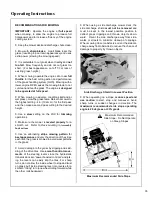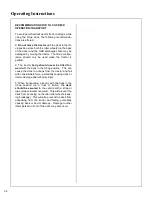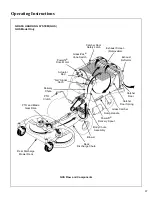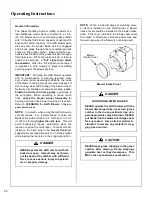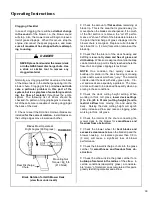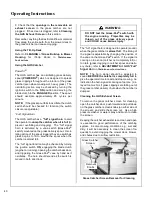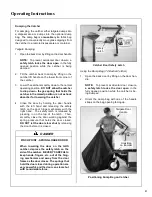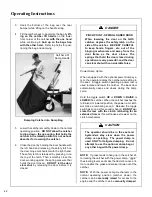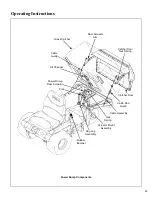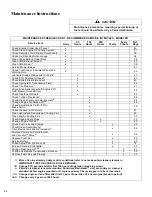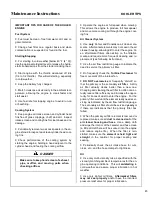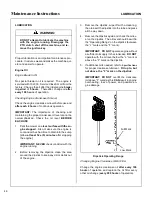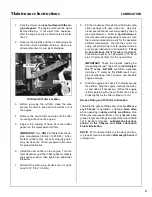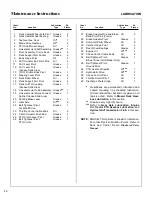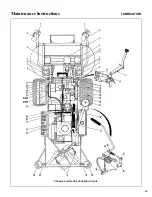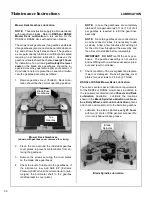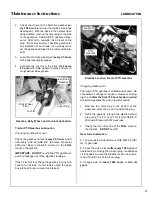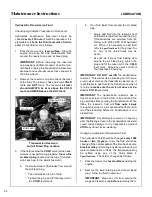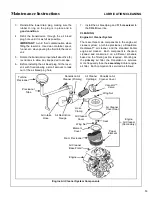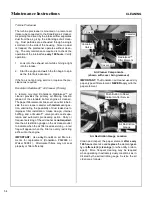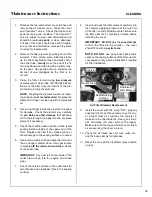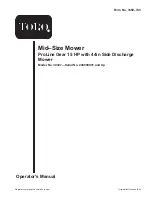
Operating Instructions
40
•
Check that the openings in the removable air
exhaust screen in the grass catcher are not
plugged. If the screen is clogged, refer to Cleaning
the GHS Exhaust Screen in this section.
Remember, anything that restricts airflow or material
flow along the entire path from the mower deck to
the grass catcher can cause clogging.
Using the Tilt-Up Deck
Refer to CLEANING of Grass Buildup in Mower
Housing for
Tilt-Up Decks
in
Maintenance
Instructions.
Using the GHS Catcher
Powerfil
®
The GHS catcher has an oscillating grass delivery
spout (POWERFIL
®
) which is designed to spread
grass clippings throughout the interior of the grass
catcher (even when mowing wet, heavy grass). The
oscillating action may be checked by turning the
ignition switch to the ON position and moving the
blade clutch to the ENGAGED position. The spout
should oscillate approximately 25 cycles per
minute.
NOTE: If the grass spout fails to oscillate, the clutch
switch should be checked for function (the switch
closure is adjustable).
“Full” Signal Horn
The GHS catcher has a “full” signal horn to alert
the operator to dump the catcher when it is full (to
prevent overfilling and clogging). The “full” signal
horn is activated by a vane switch (Grass-Pak
®
switch) mounted on the grass delivery spout. Oscil-
lating action of the spout triggers the vane switch as
grass begins to fill in around the spout when the
catcher is almost full.
The “full” signal function may be checked by turning
the ignition switch ON, engaging the blade clutch
(engine not running), opening the catcher back door,
and triggering the Grass-Pak
®
vane by hand as it
oscillates. The horn should sound as the switch is
moved in both directions.
The “full” signal horn is designed to operate (sound)
when the grass catcher is almost full. The timing of
the signal is adjustable by changing the position of
the vane on the Grass-Pak
®
switch. If the signal is
coming on too soon (catcher not completely full) or
too late (grass clogging in catcher spout and deliv-
ery chute), refer to ADJUSTMENTS of GHS “Full”
Signal Horn in
Maintenance Instructions
.
NOTE: The horn signal should be adjusted to
sound BEFORE the catcher is completely full to
give the operator time to react and stop mowing. An
indication the horn signal is coming on too late (de-
layed too much) is if grass clippings are falling out of
the grass catcher delivery chute when the catcher is
dumped.
Cleaning the GHS Exhaust Screen
To remove the grass catcher screen for cleaning,
open the catcher door, push forward and pull down
on the grass catcher screen knobs (on either side of
the screen), and slide the screen out. Use a high
pressure washer or water spray and brush to clean
the screen.
Keeping the catcher exhaust screen clean and open
is essential to good performance of the catching
system. In some mowing conditions, e.g., wet and
dirty, it will be necessary to clean the screen fre-
quently to avoid clogging the mower deck, blower,
and chutes due to airflow restriction.
Grass Catcher Screen Removal for Cleaning
WARNING
DO NOT test the Grass-Pak
®
switch with
the engine running. Projectiles may be
thrown out of the grass delivery spout,
and COULD cause serious injury.
Grass Catcher
Screen
Removal
Knobs










